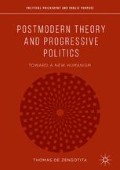Abstract
The conclusion offers reason to hope for a more unified progressive politics founded on a truly universal humanism—a revival on a cosmopolitan scale of an ideal first articulated in Western democracies that fell miserably short of realizing it. That hope is justified because—thanks to postmodernism, and in spite of the excesses it entailed—there could now be a truly representative diversity of voices involved. By appealing openly (and controversially) to educated elites—again, on a cosmopolitan scale—this vision challenges the young especially to take up an intellectual task, first of all. It invites those qualified to start from scratch and to ask again the ancient question: what is it to be human? What does it mean to be human? And it invites the same educated elites to step up and take responsibility for fashioning a political program founded on emerging answers to that ancient question, now being asked and answered in a cosmopolitan context. No one else can do it. It is their duty. And in the age of Trump in particular, and of know-nothing “autocratic populism” in general, in ascendency across the globe—it is a duty that could not be more urgent.
Access this chapter
Tax calculation will be finalised at checkout
Purchases are for personal use only
Change history
22 May 2020
The book was inadvertently published without updating the following corrections. These have been now updated.
Notes
- 1.
Besides speculative ideas about the “coming singularity” (Kurzweil 2005), more serious academic accounts include Katherine Hayles’ How We Became Posthuman: Virtual Bodies in Cybernetics, Literature and Informatics (1999); Francis Fukuyama’s The Posthuman Future (2005); and Cary Wolfe’s What is Posthumanism? (2010).
- 2.
Frantz Fanon in The Wretched of the Earth “All the elements of a solution to the great problems of humanity have, at different times, existed in European thought. But Europeans have not carried out in practice the mission which fell to them” ([1961] 2004, 237). He was giving up on Europe in that book—but he recognized the essential problem nevertheless.
- 3.
Some will find this focus on the human misguided, an ethical capitulation—a betrayal of nature and other forms of life. That concern deserves serious consideration (see Towards a New Foundation for Human Rights, forthcoming from Stanford University Press). In a nutshell, though, it comes down to this for me: are we willing to accept the special responsibility that evidently attaches to being human? We are writing and reading books like this, not whales. That’s just a fact and it holds even if—and I am seriously willing to entertain this possibility—whales are as, or even more, worthy of existence than we.
- 4.
I remember when I first heard that Trump wasn’t taking his daily security brief from the CIA seriously, I caught myself tut-tutting like a stereotypical schoolmarm in a 1940s movie—me, a veteran of the 1960s. A weird situation. I felt the same when I heard Ralph Nader say, after Trump’s election, that our only hope lay with the professional bureaucracy continuing to do its job.
- 5.
Husserl thought that Beingand Time, in rejecting the transcendental ego and focusing on average everydayness, had lapsed into mere anthropology (compare “psychologism” as the modernist philosopher’s epithet). And creators of French theory dismissed all phenomenology—indeed, any discourse that privileged the subject and its object world as “anthropology” (Kant, e.g., modern humanism in general). See Gutting (2013, 39–42). The shoe fits, and I wear it comfortably.
References
de Zengotita, Thomas. 2003. Common Ground: Finding Our Way Back to the Enlightenment. Harper’s Magazine, January, 35–44.
———. 2006. Mediated. New York: Bloomsbury.
———. 2013. Ethics and the Limits of Evolutionary Psychology. The Hedgehog Review 15 (1): 34–45.
Fanon, Frantz. (1961) 2004. The Wretched of the Earth. Trans. Richard Philcox. New York: Grove Press.
Gutting, Gary. 2013. Thinking the Impossible: French Philosophy Since 1960. Oxford: Oxford University Press.
Kurzweil, Ray. 2005. The Singularity Is Near: When Humans Transcend Biology. New York: Penguin.
Author information
Authors and Affiliations
Rights and permissions
Copyright information
© 2019 The Author(s)
About this chapter
Cite this chapter
de Zengotita, T. (2019). Conclusion: Toward a New Humanism. In: Postmodern Theory and Progressive Politics. Political Philosophy and Public Purpose. Palgrave Macmillan, Cham. https://doi.org/10.1007/978-3-319-90689-8_12
Download citation
DOI: https://doi.org/10.1007/978-3-319-90689-8_12
Published:
Publisher Name: Palgrave Macmillan, Cham
Print ISBN: 978-3-319-90688-1
Online ISBN: 978-3-319-90689-8
eBook Packages: Political Science and International StudiesPolitical Science and International Studies (R0)

